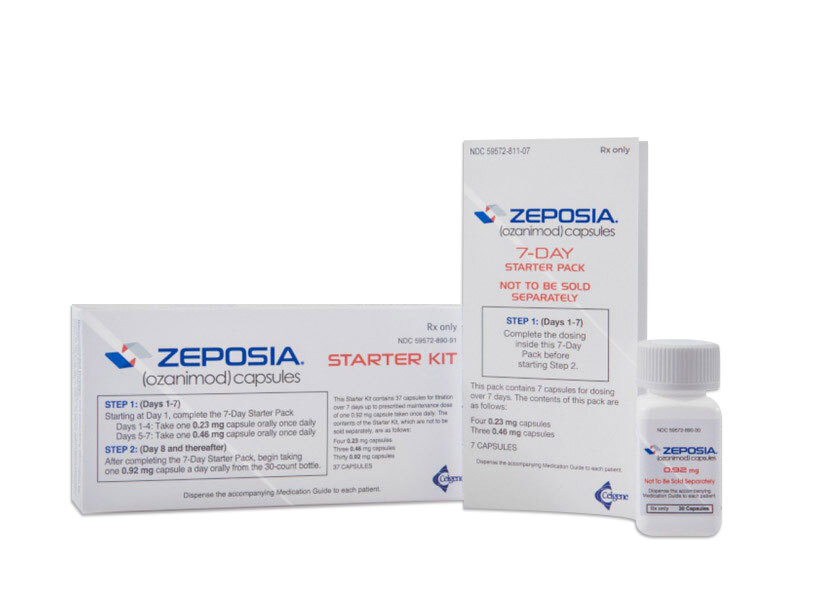Zeposia (ozanimod) vs Tyruko (natalizumab-sztn)
Zeposia (ozanimod) vs Tyruko (natalizumab-sztn)
Zeposia (ozanimod) is an oral sphingosine 1-phosphate receptor modulator indicated for the treatment of relapsing forms of multiple sclerosis (MS), which works by trapping immune cells in lymph nodes, thus reducing their ability to reach the central nervous system and cause inflammation. Tyrvaya (natalizumab-sztn), on the other hand, is a monoclonal antibody administered intravenously every four weeks, designed to inhibit immune cells from crossing blood-brain barrier, thereby reducing inflammation and damage in the central nervous system associated with MS. When deciding between the two, patients should consider factors such as the route of administration, the frequency of dosing, and the different side effect profiles, as well as discussing with their healthcare provider any potential risks, such as Zeposia's need for cardiac monitoring upon initiation and Tyrvaya's association with a rare but serious brain infection called progressive multifocal leukoencephalopathy (PML).
Difference between Zeposia and Tyruko
| Metric | Zeposia (ozanimod) | Tyruko (natalizumab-sztn) |
|---|---|---|
| Generic name | Ozanimod | Natalizumab-sztn |
| Indications | Multiple sclerosis, Ulcerative colitis | Multiple sclerosis, Crohn's disease |
| Mechanism of action | Sphingosine 1-phosphate receptor modulator | Integrin inhibitor |
| Brand names | Zeposia | Tyruko |
| Administrative route | Oral | Intravenous |
| Side effects | Upper respiratory infection, Liver enzyme elevation, Hypertension | Headache, Fatigue, Urinary tract infections, Infusion-related reactions |
| Contraindications | Recent myocardial infarction, Unstable angina, Stroke, Class III/IV heart failure | Progressive multifocal leukoencephalopathy (PML), Hypersensitivity to natalizumab |
| Drug class | Sphingosine 1-phosphate receptor modulator | Monoclonal antibody |
| Manufacturer | Bristol Myers Squibb | Biogen |
Efficacy
Efficacy of Zeposia (Ozanimod) in Multiple Sclerosis
Zeposia (ozanimod) is an oral medication approved for the treatment of relapsing forms of multiple sclerosis (MS), which includes clinically isolated syndrome, relapsing-remitting disease, and active secondary progressive disease in adults. As a sphingosine 1-phosphate receptor modulator, Zeposia works by trapping certain white blood cells in lymph nodes, preventing them from reaching the central nervous system where they could cause inflammation and damage to nerve cells. Clinical trials have demonstrated that Zeposia effectively reduces the annual relapse rate in patients with relapsing forms of MS. Furthermore, it has been shown to slow down the progression of physical disability and reduce the number of brain lesions as detected by MRI scans, which are key measures of disease activity in MS.
The SUNBEAM and RADIANCE Part B studies are pivotal phase 3 clinical trials that have evaluated the efficacy of Zeposia. Results from these trials indicate that Zeposia significantly reduced the annualized relapse rate compared to interferon beta-1a, a commonly used treatment for MS. Additionally, Zeposia was associated with a lower rate of new or enlarging brain lesions on MRI. These findings suggest that Zeposia can be an effective treatment option for patients with relapsing forms of MS, offering both a reduction in disease activity and a convenient oral dosing regimen.
Efficacy of Tysabri (Natalizumab) in Multiple Sclerosis
Tysabri (natalizumab), a monoclonal antibody administered through intravenous infusion, is approved for the treatment of relapsing forms of multiple sclerosis. Tysabri works by inhibiting the movement of potentially damaging immune cells from the bloodstream, across the blood-brain barrier, and into the brain and spinal cord. This mechanism helps to reduce inflammation and subsequent damage in the central nervous system. Clinical trials have shown that Tysabri significantly reduces the annual relapse rate and the progression of disability in patients with relapsing forms of MS. Moreover, MRI studies have demonstrated that Tysabri can lead to a decrease in the number and volume of active brain lesions.
The AFFIRM and SENTINEL studies are two major phase 3 clinical trials that have investigated the efficacy of Tysabri. In the AFFIRM study, Tysabri was shown to reduce the risk of disability progression by 42% compared to placebo. In the SENTINEL study, when added to interferon beta-1a, Tysabri further reduced the annualized relapse rate compared to interferon beta-1a alone. These results underscore Tysabri's role as a highly effective treatment for reducing both relapses and disease progression in patients with relapsing forms of MS, although its use is generally reserved for patients who have not responded adequately to, or cannot tolerate, other treatments for MS due to its risk profile.
Regulatory Agency Approvals
Zeposia
-
European Medical Agency (EMA), European Union

-
Food and Drug Administration (FDA), USA

-
Health Canada

-
Therapeutic Goods Administration (TGA), Australia

Tyruko
-
European Medical Agency (EMA), European Union

-
Food and Drug Administration (FDA), USA

Access Zeposia or Tyruko today
If Zeposia or Tyruko are not approved or available in your country (e.g. due to supply issues), you can access them via Everyone.org.
How it works

Make an enquiry
Choose the medicine you want to buy, answer a couple of questions, and upload your prescription to speed things up. We’ll get back to you within 24 hours.


Make an enquiry
Choose the medicine you want to buy, answer a couple of questions, and upload your prescription to speed things up. We’ll get back to you within 24 hours.


Breeze through the paperwork
We'll guide you through the required documents for importing unapproved medicine, ensuring you have all the necessary information.


Get a personalized quote
We’ll prepare a quote for you, including medicine costs and any shipping, administrative, or import fees that may apply.


Receive your medicine
Accept the quote and we’ll handle the rest - sourcing and safely delivering your medicine.

Some text on this page has been automatically generated. Speak to your physician before you start a new treatment or medication.
Let's talk
If you have any questions, call us or send us a message through WhatsApp or email:
Contact us




